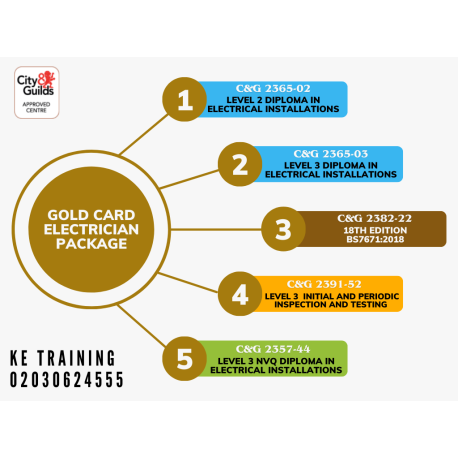No products
Prices are tax excluded
 View larger
View larger
GOLD CARD ELECTRICIAN PACKAGE
New product
If you're interested in becoming a Gold Card Electrician, you must complete an apprenticeship or traineeship in electrical work. This typically involves completing a City & Guilds 2365 Course Which includes Level 2 and Level 3 Diploma in Electrical Installation (Buildings and Structures), City & Guilds 2357-91 Level 3 NVQ Diplomas in Electrotechnical Technology and AM2E.
More info
|
Course Overview |
This course is designed for individuals interested in pursuing a career as an electrician in the building and construction industry. This course is suitable for anyone aged 18 and above regardless of those with no experience or qualifications, who want to build their career in electrical and work in commercial, industrial and domestic electrics. The minimum requirement for this course is you will have Maths and English to basic GCSE standard, however, if you do not, we can still assess you using a functional skill test to find out if you are at the right level. |
||||||||||||||||||||||
|---|---|---|---|---|---|---|---|---|---|---|---|---|---|---|---|---|---|---|---|---|---|---|---|
|
Step 1 |
Level 2 Diploma in Electrical Installations (Buildings and Structures) (2365-02) |
||||||||||||||||||||||
|
|||||||||||||||||||||||
|
Step 2 |
Level 3 Diploma in Electrical Installations (Buildings and Structures) (2365-03) |
||||||||||||||||||||||
|
|||||||||||||||||||||||
| Step 3 |
18th Edition - Level 3 Award in the Requirements for Electrical Installations BS 7671:2018 (C&G 2382-22) | ||||||||||||||||||||||
|
|||||||||||||||||||||||
|
Step 4 |
Level 3 Award Electrical Installation Inspection Testing, Certification and Reporting (EAL 2625) |
||||||||||||||||||||||
|
|||||||||||||||||||||||
|
Step 5 |
Level 3 NVQ Diploma in Installing Electrotechnical Systems and Equipment (2357-44) |
||||||||||||||||||||||
|
|||||||||||||||||||||||
| Step 6 |
AM2 |
||||||||||||||||||||||
|
The AM2 assessment measures the competency of an electrical installation apprentice or trainee to perform a range of practical tasks and demonstrate knowledge and understanding of electrical installation principles and practices. The AM2 assessment is conducted over two days in a simulated workplace environment. It assesses the practical skills, knowledge, and behaviours required for a competent electrical installation professional. Successful completion of the AM2 assessment is a requirement for obtaining full electrical installation qualifications and entering the industry as a fully qualified electrician. |
|||||||||||||||||||||||


